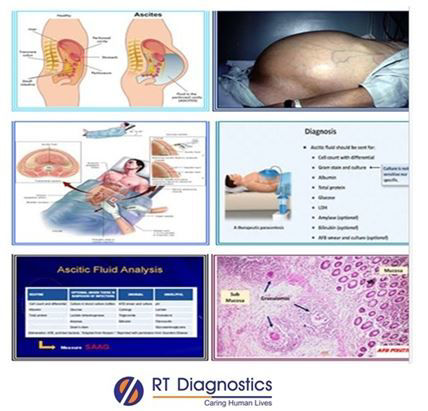AFB - Ascitic Fluid
AFB – Acid- Fast- Bacillus is a kind of Bacteria that is the reason for Tuberculosis (TB) and other infections. TB causes Health issues to the lungs, Brain, Spine, and Kidneys. As per the Doctor’s recommendations, samples taken from various places such as Blood, Urine, Phlegm for this test for diagnosing Tuberculosis and infections like Leprosy. AFB test in Ascitic Fluid helps to diagnose Tuberculous Peritonitis (TP).
ACID FAST BACILLUS (AFB) – ASCITIC FLUID:
Why AFB Ascitic fluid test?
CLINICAL INFORMATION :
AFB Ascitic fluid– TB ascites is one of the clinical signs of abdominal TB and since it is non-specific it can mimic symptoms of many other infectious diseases. Blood glucose ratio is a useful test in differentiating TB peritonitis from other causes of ascites. Once the fluid specimen screens the suspected cause of the disease or condition causing ascites, further analysis is performed for confirmation. Peritoneal fluid analysis is used to help diagnose the cause of fluid build-up in the abdomen (ascites) and/or inflammation of the peritoneum (peritonitis). High attenuation of ascites in abdominal ultrasound is thought to be due to high protein and cellular content. Associated peritoneal enhancement is present due to reactivation of latent TB in the peritoneum from hematogenous spread from primary lung foci. Ascetic fluid adenosine deaminase (ADA) is considered a more sensitive and specific method used for the early diagnosis of TB ascites. Other tests include cell counts, bacterial culture, and PCR. The confirmation of TB peritonitis is done with the aspiration of ascetic fluid and/or peritoneal biopsy and through microscopy by detection of mycobacteria on smear, the culture of ascetic fluid for mycobacterium, demonstration of granulomata on histological assessment of peritoneal biopsy specimens. Peritonitis is a medical emergency and if untreated by neglect the infection from the peritoneum can spread throughout the body known as sepsis which is a life-threatening condition that consequently leads to shock, organ failure, and eventually death. Signs of peritonitis include abdominal pain or tenderness, bloating or feeling of fullness in the abdomen, fever, nausea and vomiting, loss of appetite, diarrhea, low urine output, and thirst. Other tests for ascites performed are clinically based for ascetic fluid are by inspection for bulging flanks, auscultation. Followed by clinical examination by palpation, flank dullness, shifting dullness, etc., for performing ascetic tap.

General Instructions:
Sample Requirement: Sample specimen aspiration from the peritoneum.Test Preparation: None.
NOTE - Sample for specimen collections may vary based on the patient’s condition/cases according to the patient’s presentingcomplaints / signs or symptoms:
SPECIMENREQUIREMENT (Special or Rare Cases) - As instructed and guided by Physician / Clinician / Pathologist / as per Laboratory’s requirements, according to procedures and protocols.
This Multi-Specialty Clinical Referral Laboratory “RTDIAGNOSTICS” provides precise and accurate tests with an extensive range of testing services to the medical centers to help in the diagnosis and identification of pathology in the test specimens for infectious diseases and also to evaluate the function of organ systems of the patient. It prevents further complications and helps to stabilize and restore health to near normalcy at the earliest without delay.



